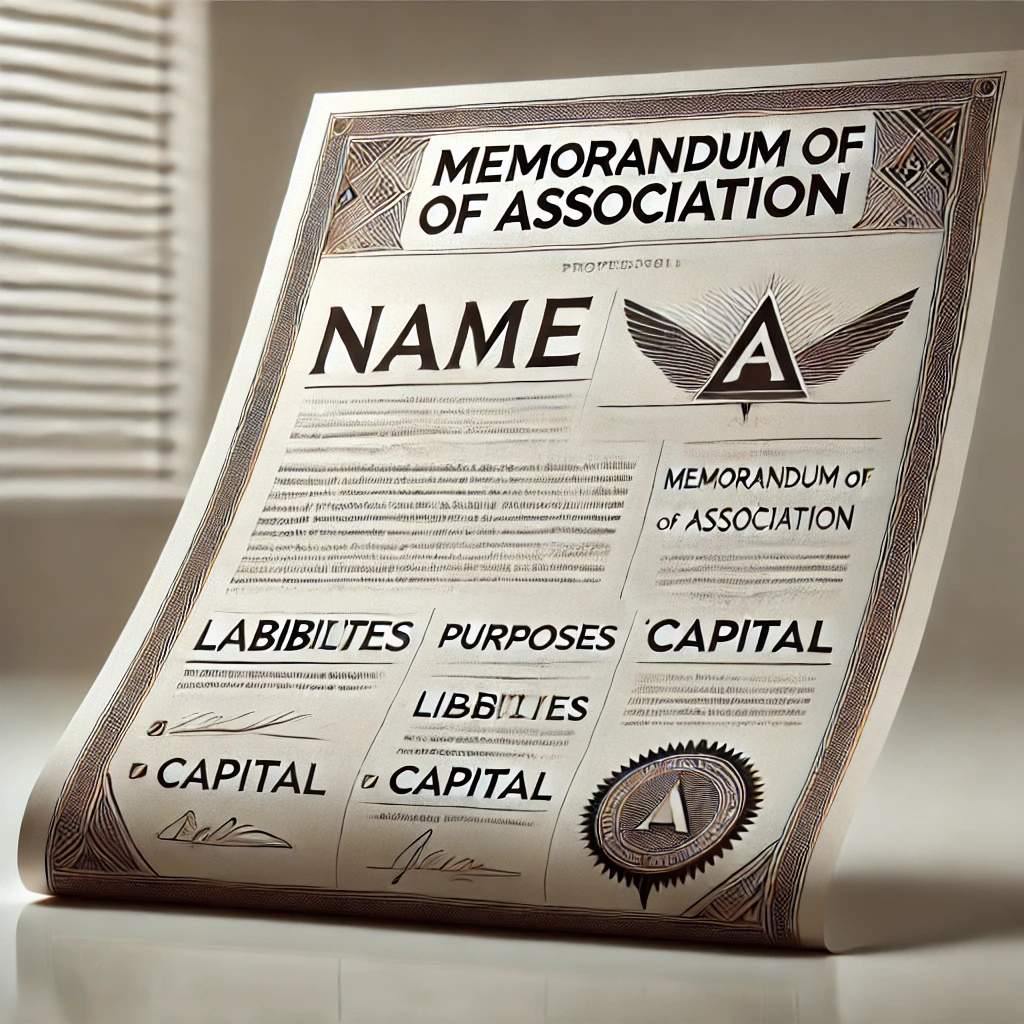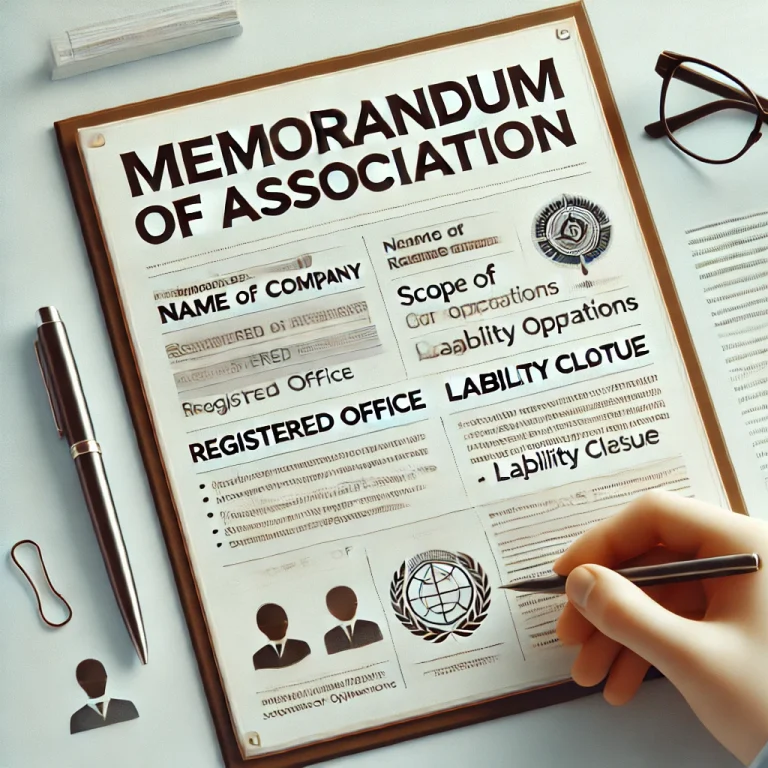A Memorandum of Association is one of the most crucial legal documents for a company’s incorporation in India. Generally, it acts as a constitution or charter defining limits within which a company can operate and outlines its relationship with external stakeholders, including shareholders, creditors, or regulators. It details all the basic facts about the company, such as name, registered office, objectives, and liability of its members. This document is important both for private and public companies because it explains to companies what the company may legally do and establishes the borders for its legal life.
What is Memorandum of Association?
A Memorandum of Association is the foundation of the structure of a company. It produces essential information, which is necessary for the legal existence of a company, indicating a registered office, objects, capital, and the liability of its members. The document becomes a guide to the conduct of the company in its internal and external activities. This clearly defines the range of permissible activities of the company to the shareholders, government agencies, and others who may have dealings with the company.
The companies cannot act beyond the scope of the MOA. The actions taken, which are outside the purview of the MOA, are ultra vires, or beyond their powers and hence illegal.
Clauses of Memorandum of Association
The Memorandum of Association contains six essential clauses, each specifying different aspects of the company’s constitution.
Name Clause
The Name Clause spells out the actual name of the company. In other words, this name must be unique and not identical to that of any existing company. It must also conform to some specific naming requirements under the Companies Act. For instance, a private company’s name must have “Private Limited” at the end, and that of a public company must have “Limited.”
Registered Office Clause
The Registered Office Clause specifies the location of a company’s registered office. For all legal and correspondence purposes, all official documents and notices are addressed to this address. The registered office must also be located within the jurisdiction of the Registrar of Companies where the company is registered.
Object Clause
The Object Clause is one of the most important clauses as it defines the scope of activities the company is permitted to undertake. It is divided into three parts:
- Main Objects: The primary objectives of the company for which it was established.
- Incidental or Ancillary Objects: Activities that are required to achieve the main objectives.
- Other Objects: Any other business activities the company may pursue in the future.
Liability Clause
The Liability Clause expresses the liability of the members of the company. In the case of most companies, it is restricted to the amount of the share which remains unpaid on their shares. In the case of the limited guarantee companies, the liability is limited to the amount of contribution that the members guarantee to contribute in case the company winds up.
Capital Clause
The Capital Clause describes the authorized share capital of the company. Authorized share capital is the maximum amount of money the company is authorized to raise by way of issued shares. It also describes how that amount of capital would be divided into shares of a fixed amount.
| Clause | Description |
|---|---|
| Name Clause | Specifies the official name of the company. |
| Registered Office Clause | States the location of the registered office for legal correspondence. |
| Object Clause | Outlines the main objectives and ancillary activities the company can engage in. |
| Liability Clause | Defines the extent of liability of shareholders or members. |
| Capital Clause | Specifies the authorized share capital and its division into shares. |
Memorandum of Association Format
A Memorandum of Association must be drafted in a specific format, as prescribed under the Companies Act. Below are the main sections typically included in the format:
- Company Name: Must be unique and should comply with legal requirements.
- Registered Office Address: It is the official address of the company.
- Objectives: Listing of main objectives, ancillary objectives, and any other intended business activities.
- Liability of Members: Stating whether it is limited or unlimited.
- Share Capital: Defining its authorized capital and division of shares.
- Subscription Clause: It is signed by the initial subscribers to the company’s shares and states that they agree to take up shares.
This format must be followed rigorously, as any deviation can result in delays or rejections by the Registrar of Companies.

Objectives in Registering Memorandum of Association
Registering an MOA serves several key objectives, including:
- Legal Formation: Creates the identity of the company in legal eyes.
- Defines Scope of Operations: It spells out what a firm can do legally.
- Regulates Relationships: It helps to define the relationship that a company has with its shareholders, creditors, as well as other stakeholders.
- Offers Transparency: Provides stakeholders with a clear understanding of the objectives of a company or the nature of its operations.
- Prevent ultra vires acts: The company, while conducting business, ensures that it does not engage in any illegal or unauthorized activities and holds within the confines of the laws and their applicability as far as operations are concerned.
When and How to Alter Your Memorandum of Association
There may also arise situations where a company needs to make some kind of alteration in its Memorandum of Association. This might include expansion of the business or shifting of registered offices, among other things. Under such circumstances, the companies have to go through certain procedures as mandated by the Companies Act.
- Board Approval: The company shall seek and obtain the approval of its Board of Directors.
- Special Resolution: The shareholders at a general meeting, by a special resolution, must pass the resolution.
- Approval from Registrar: After passing the resolution, the alteration needs to be received by the Registrar of Companies for approval.
Among the things that can be changed about a company are its name clause, registered office clause, and object clause, amongst others, and in doing so, it must be in accordance with the law and approved by the relevant authorities.
Benefits of MOA
The Memorandum of Association provides numerous benefits:
- Legal Identity: It offers a legal identity to the company, and so it remains an independent entity from its members.
- Clarity towards Stakeholders: The MOA provides clear views to the shareholders, creditors, and regulators regarding the objectives of the company and the scope of its activities.
- Risk Management: The liabilities of the members define and restrict the company from taking any additional extreme financial risks with individual shareholders.
- Transparency: It helps maintain transparency towards the operations, objectives, and activities of the company.
The Memorandum of Association is a very fundamental document that makes up the backbone of any company’s formation and operation. In such a document, the memo defines the scope of activities that can be engaged in by the company and the company’s relationship with its external stakeholders. Therefore, following the rules provided by the MOA ensures that a company monitors legal obligations, transparently conducts itself, and protects itself from arbitrary or ultra vires acts.
MOA FAQs
What is the Memorandum of Association?
The Memorandum of Association (MOA) is a legal document that outlines the scope of a company’s operations, its objectives, and the liabilities of its members.
Can the Memorandum of Association be altered?
Yes, the MOA can be altered, but it requires board approval, a special resolution by shareholders, and approval from the Registrar of Companies.
What is the difference between Memorandum of Association and Articles of Association?
The MOA defines the company’s structure and permissible activities, while the Articles of Association outline the internal rules and regulations for running the company.
What is the purpose of Object Clause in the Memorandum of Association?
The Object Clause defines the company’s objectives and activities that it is legally allowed to undertake.
What happens if a company acts outside its Memorandum of Association?
Any activity beyond the scope of the MOA is deemed ultra vires, meaning it is illegal, and the company cannot legally bind itself to those actions.

